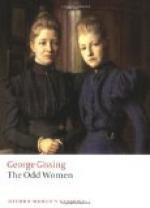Though Miss Barfoot had something less than a woman’s average stature, the note of her presence was personal dignity. She was handsome, and her carriage occasionally betrayed a consciousness of the fact. According to circumstances, she bore herself as the lady of aristocratic tastes, as a genial woman of the world, or as a fervid prophetess of female emancipation, and each character was supported with a spontaneity, a good-natured confidence, which inspired liking and respect. A brilliant complexion and eyes that sparkled with habitual cheerfulness gave her the benefit of doubt when her age was in question; her style of dress, gracefully ornate, would have led a stranger to presume her a wedded lady of some distinction. Yet Mary Barfoot had known many troubles, poverty among them. Her experiences and struggles bore a close resemblance to those which Rhoda Nunn had gone through, and the time of trial had lasted longer. Mental and moral stamina would have assured her against such evils of celibacy as appeared in the elder Maddens, but it was to a change of worldly fortune that she owed this revival of youthful spirit and energy in middle life.
‘You and I must be friends,’ she said to Monica, holding the girl’s soft little hand. ‘We are both black but comely.’
The compliment to herself seemed the most natural thing in the world. Monica blushed with pleasure, and could not help laughing.
It was all but decided that Monica should become a pupil at the school in Great Portland Street. In a brief private conversation, Miss Barfoot offered to lend her the money that might be needful.
’Nothing but a business transaction, Miss Madden. You can give me security; you will repay me at your convenience. If, in the end, this occupation doesn’t please you, you will at all events have regained health. It is clear to me that you mustn’t go on in that dreadful place you described to Miss Nunn.’
The visitors took their leave at about five o’clock.
‘Poor things! Poor things!’ sighed Miss Barfoot, when she was alone with her friend. ‘What can we possibly do for the older ones?’
‘They are excellent creatures,’ said Rhoda; ’kind, innocent women; but useful for nothing except what they have done all their lives. The eldest can’t teach seriously, but she can keep young children out of mischief and give them a nice way of speaking. Her health is breaking down, you can see.’
‘Poor woman! One of the saddest types.’
‘Decidedly. Virginia isn’t quite so depressng—but how childish!’
’They all strike me as childish. Monica is a dear little girl; it seemed a great absurdity to talk to her about business. Of course she must find a husband.’
‘I suppose so.’
Rhoda’s tone of slighting concession amused her companion.
‘My dear, after all we don’t desire the end of the race.’
‘No, I suppose not,’ Rhoda admitted with a laugh.




